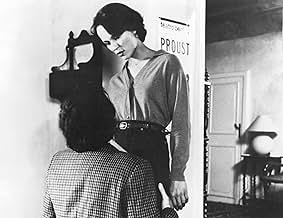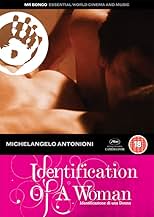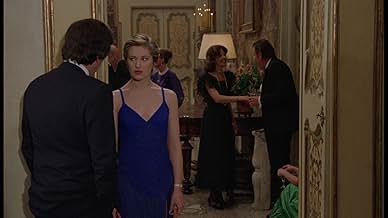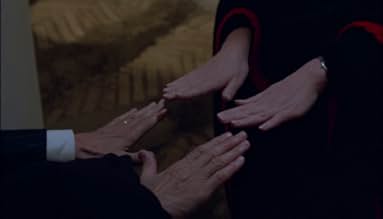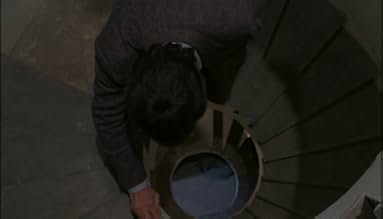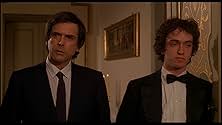IMDb RATING
6.6/10
3.5K
YOUR RATING
A director's wife leaves him. He pursues another woman who also departs. This inspires a movie idea about women's relationships. He searches for an actress to star in the film and his life.A director's wife leaves him. He pursues another woman who also departs. This inspires a movie idea about women's relationships. He searches for an actress to star in the film and his life.A director's wife leaves him. He pursues another woman who also departs. This inspires a movie idea about women's relationships. He searches for an actress to star in the film and his life.
- Awards
- 1 win & 5 nominations total
Enrica Antonioni
- Nadia
- (as Enrica Fico)
Giampaolo Saccarola
- The Gorilla
- (as Gianpaolo Saccarola)
Dado Ruspoli
- Mavi's Father
- (as Alessandro Ruspoli)
Pier Francesco Aiello
- Young Man at Party
- (as Pierfrancesco Aiello)
Carlos Alberto Valles
- Close-Up Man
- (as Carlos Valles)
Featured reviews
As introduced by Lorenzo Codelli, Identification of a Woman was presented in the Cannes Film Festival in 1982 and received a special anniversary award. It's like a personal movie because the lead character Niccolo (Tomas Milian) is a film director, and tells of a personal crisis of the filmmaker. Niccolo was played by a leading Italian actor of the time, Tomas Milian, who was famous for his roles in Italian spaghetti westerns, and was an action star. This was essential the last feature film made by Michelangelo Antonioni before his stroke, before which he spent most of the 80s publishing short stories and exhibiting his abstract paintings.
And personally, my bad track record with Antonioni's post L'Eclisse movies unfortunately continues. I'm pretty sure I'm missing something very obvious (or could be it so subtle it eludes me?) that I'm finding each of them quite difficult to sit through (save for perhaps The Passenger), and to try and see its underlying meaning. Perhaps I am just scratching the surface and in doing so, fail to appreciate what the movie's about and for.
Or maybe Identification of a Woman is indeed the weaker of the lot, because of certain resemblance to plot design with his earlier masterpieces? For starters there seemed to be some repetitive themes revisited, but that I'm fine with because it made it easier to click with and connect. Just like how Niccolo and his squeeze Mavi (Daniela Silverio) spend considerable time at an emotionally empty high society party reminiscent of that in L'Notte, where they nurse issues from the heart, as well as for one to come to terms with the other's secret admirer.
Surely the sex is good, and the movie wastes absolutely no time in getting beneath the sheets for some surprisingly erotic time of a horizontal tango complete with underarm forests, but naturally physical love doesn't compensate for emotional depth absent between the lovers, highlighting something inherent wrong in their relationship. Having anonymous threats made to Niccola also didn't help, as he experienced first hand how these threats got carried out to hurt those he loved. We spend a bit of time with their attempts to escape from a stalker, and even had a technically brilliant sequence involving a deep mist that I thought contemporary movies like Frank Darabont's The Mist, or the video game movie adaptation of Shallow Hill, had taken a huge leaf from.
For Niccolo's inability to declare his love and address their conflicts, we get a dose of L'Avventura here. Mavi disappears, and we don't really get to see much of her thereafter. Niccolo tries to launch a search, and we get into the second half of the movie where we see his new relationship with a young actress Ida (Christine Boisson). But of course there are issues to grapple with here, and I thought was something I'd understand as well, and that's the continued holding out of the candle for someone else, together with the notion of love versus need, and serving as an emotional crutch. It's not fair of course, but there's more challenges ahead for Niccola in his relationship with Ida to accept, but by the time we get to it, I'd more or less didn't really care for Niccola anymore.
Which probably contrasted to a statement which Lorenzo Codelli shared about what Antonioni said regarding this movie being about its characters. I thought his earlier movies had stronger and more interesting characters, or at least those who can hook my attention down and allowed me to care for them a bit, versus those in this movie. Then again, I suspect I may be on a different wavelength since I enjoyed most of Antonioni's earliest works in the 50s, as compared to the more contemporary ones shown this week so far.
And personally, my bad track record with Antonioni's post L'Eclisse movies unfortunately continues. I'm pretty sure I'm missing something very obvious (or could be it so subtle it eludes me?) that I'm finding each of them quite difficult to sit through (save for perhaps The Passenger), and to try and see its underlying meaning. Perhaps I am just scratching the surface and in doing so, fail to appreciate what the movie's about and for.
Or maybe Identification of a Woman is indeed the weaker of the lot, because of certain resemblance to plot design with his earlier masterpieces? For starters there seemed to be some repetitive themes revisited, but that I'm fine with because it made it easier to click with and connect. Just like how Niccolo and his squeeze Mavi (Daniela Silverio) spend considerable time at an emotionally empty high society party reminiscent of that in L'Notte, where they nurse issues from the heart, as well as for one to come to terms with the other's secret admirer.
Surely the sex is good, and the movie wastes absolutely no time in getting beneath the sheets for some surprisingly erotic time of a horizontal tango complete with underarm forests, but naturally physical love doesn't compensate for emotional depth absent between the lovers, highlighting something inherent wrong in their relationship. Having anonymous threats made to Niccola also didn't help, as he experienced first hand how these threats got carried out to hurt those he loved. We spend a bit of time with their attempts to escape from a stalker, and even had a technically brilliant sequence involving a deep mist that I thought contemporary movies like Frank Darabont's The Mist, or the video game movie adaptation of Shallow Hill, had taken a huge leaf from.
For Niccolo's inability to declare his love and address their conflicts, we get a dose of L'Avventura here. Mavi disappears, and we don't really get to see much of her thereafter. Niccolo tries to launch a search, and we get into the second half of the movie where we see his new relationship with a young actress Ida (Christine Boisson). But of course there are issues to grapple with here, and I thought was something I'd understand as well, and that's the continued holding out of the candle for someone else, together with the notion of love versus need, and serving as an emotional crutch. It's not fair of course, but there's more challenges ahead for Niccola in his relationship with Ida to accept, but by the time we get to it, I'd more or less didn't really care for Niccola anymore.
Which probably contrasted to a statement which Lorenzo Codelli shared about what Antonioni said regarding this movie being about its characters. I thought his earlier movies had stronger and more interesting characters, or at least those who can hook my attention down and allowed me to care for them a bit, versus those in this movie. Then again, I suspect I may be on a different wavelength since I enjoyed most of Antonioni's earliest works in the 50s, as compared to the more contemporary ones shown this week so far.
10Xanadu-2
A very beautiful film with that special Antonioni atmosphere. I can identify with the feeling of emptiness and the people who can´t really communicate with each other. Modern life and adulthood seems shallow and a bit soulless. You have to fill it with something and make it human again.
The first time I saw it I was disapointed but it improved greatly with the second viewing and I want to see it again. There are new things to discover each time as with all of Antonionis´ films.
The first time I saw it I was disapointed but it improved greatly with the second viewing and I want to see it again. There are new things to discover each time as with all of Antonionis´ films.
Antonioni's "The Passenger" is probably my favorite film. It's a singular work which manages to have the highest philosophical ambitions without seeming the least pretentious. That's not to say that Antonioni never seems pretentious. He sometimes is very much so, and this is a case in point. I wouldn't describe this as a good movie exactly- it's a bit too self-absorbed, with some lousy dialog and a howlingly funny leading man, who seems like an SNL parody of an Italian leading man. But having said that, it's still vintage Antonioni, and he was a master. For every moment that makes a fan wince, there are others of exceptional compositional beauty: street scenes in which "extras" take on inarticulable metaphysical weight, moments, such as a scene where the protagonist is lost in fog, that seem to depict the invisible. The theme of the film could seem misogynistic, and in a way it is. But really, this film is about the unknowability of the Other, and the way that black hole nonetheless illuminates Being.
Antonioni's last film prior to his suffering a stroke is this very typical effort (co-written with Gerard Brach and Tonino Guerra), dealing with a number of key themes that run through his work – lack of communication, the mystery-as-journey-of-self-discovery, etc. That said, the film wasn't picked up for U.S. release until 1996 and is consequently perhaps the least-seen of Antonioni's films from his post-AVVENTURA phase!
Anyway, the mystery element links the film with the director's earlier BLOW UP (1966) and THE PASSENGER (1975); still, it's never as intriguing here as in those more celebrated titles (especially since, for once, it's explained away at the end!) but, as I said, the film eventually emerges to be more about the mid-life crisis of its central character (despite the title). Interestingly, he's a film director – though "Euro-Cult" favorite Tomas Milian feels as incongruous to Antonioni's cinema as Marcello Mastroianni's presence had been in LA NOTTE (1961)! He has an obsessive relationship with a young woman (even enjoying some LAST TANGO IN Paris [1972]-type sex scenes!) who eventually leaves him and disappears (shades also of L'AVVENTURA [1960]); while searching for her, he meets a variety of other willing girls (among them Antonioni's own future wife Enrica Fico). Marcel Bozzuffi appears in one brief, irrelevant scene as Milian's brother.
Overall, the film is tiresomely long and often mirrors the tedium experienced by the characters; the ending, however, is a beauty – suggesting that, even if he's a failure at love, a film director is still left with his imagination. Carlo Di Palma's cinematography is notable, too – particularly at the Venice location (where, coincidentally, I saw the Antonionis three years ago!) and during the tense fog-bound sequence; the film's score, then, is a mix of electronic, ambient and pop – and all very much of its period. As was the case with THE PASSENGER, THE MYSTERY OF OBERWALD (which is now one of only two features by the director I've yet to catch up with!) and BEYOND THE CLOUDS (1995), Antonioni had a hand in the editing of the film; here, he receives sole credit for this and the result makes especially effective use of ellipses (the factors of time and space had always been a primary concern in his work – thus making the apparently mocking recourse to science-fiction at the end anything but coincidental!).
Anyway, the mystery element links the film with the director's earlier BLOW UP (1966) and THE PASSENGER (1975); still, it's never as intriguing here as in those more celebrated titles (especially since, for once, it's explained away at the end!) but, as I said, the film eventually emerges to be more about the mid-life crisis of its central character (despite the title). Interestingly, he's a film director – though "Euro-Cult" favorite Tomas Milian feels as incongruous to Antonioni's cinema as Marcello Mastroianni's presence had been in LA NOTTE (1961)! He has an obsessive relationship with a young woman (even enjoying some LAST TANGO IN Paris [1972]-type sex scenes!) who eventually leaves him and disappears (shades also of L'AVVENTURA [1960]); while searching for her, he meets a variety of other willing girls (among them Antonioni's own future wife Enrica Fico). Marcel Bozzuffi appears in one brief, irrelevant scene as Milian's brother.
Overall, the film is tiresomely long and often mirrors the tedium experienced by the characters; the ending, however, is a beauty – suggesting that, even if he's a failure at love, a film director is still left with his imagination. Carlo Di Palma's cinematography is notable, too – particularly at the Venice location (where, coincidentally, I saw the Antonionis three years ago!) and during the tense fog-bound sequence; the film's score, then, is a mix of electronic, ambient and pop – and all very much of its period. As was the case with THE PASSENGER, THE MYSTERY OF OBERWALD (which is now one of only two features by the director I've yet to catch up with!) and BEYOND THE CLOUDS (1995), Antonioni had a hand in the editing of the film; here, he receives sole credit for this and the result makes especially effective use of ellipses (the factors of time and space had always been a primary concern in his work – thus making the apparently mocking recourse to science-fiction at the end anything but coincidental!).
First the good. The fog scene. OMG. Incredible. Even if you decide to skip this movie, you should try to find that scene and watch it. Next the bad: ouch dude my brain hurts.
"Identification of a Woman" was the last feature film by master director Michelangelo Antonioni before he suffered a debilitating stroke and lost his ability to communicate. It was also his long-awaited, eagerly-anticipated salivatorily-received return to the cinema of his native Italy after some 15 years making films in the UK & USA. This is a landmark for the fans, and as far as that goes I am... how does one say "fanboi" in Italian?
But wow, this is a difficult film.
Although the story is easy enough to follow (a director searches for the perfect female character for his latest movie whilst personally going through several women in his life), the plot is not the main focus of the movie. Rather, the main focus is on Antonioni's style of storytelling which has always been cryptic and deliberately confounding.
In this case it can be outright frustrating or even infuriating. This is because, unlike Antonioni's earlier Italian works that you probably love him for ("L'avventura", "La notte", "L'eclisse", "Red Desert"), here of course we don't have the wonderfully human Monica Vitti or any of the other interesting characters such as L;eclisse's boy-faced charmer Alain Delon or Red Desert's broodingly introspective Richard Harris. Here the characters are all deliberately wooden personifications of social tiers and personality types. While, yes, that successfully shifts focus to the theme of the film, it makes for a difficult movie watching experience.
Further complicating the experience are some explicit sexual scenes which can be disturbing to watch (a scene of a man aggressively pleasuring a woman with his hand, leaving nothing to the imagination) which was undoubtedly Antonioni's deliberate embracing of the new sexually explicit cinematic style of the 80s. Indeed, a prominent theme in many of his works is that new ways must be forcefully embraced even at the expense of losing our traditions.
So it all fits with what he's saying here. I won't argue with his presentation. I'll just say, wow that was difficult. Other reviewers have noted that you really have to watch this film twice. I'm sure I'll give it another go soon enough. I just need to rest my brain first.
"Identification of a Woman" was the last feature film by master director Michelangelo Antonioni before he suffered a debilitating stroke and lost his ability to communicate. It was also his long-awaited, eagerly-anticipated salivatorily-received return to the cinema of his native Italy after some 15 years making films in the UK & USA. This is a landmark for the fans, and as far as that goes I am... how does one say "fanboi" in Italian?
But wow, this is a difficult film.
Although the story is easy enough to follow (a director searches for the perfect female character for his latest movie whilst personally going through several women in his life), the plot is not the main focus of the movie. Rather, the main focus is on Antonioni's style of storytelling which has always been cryptic and deliberately confounding.
In this case it can be outright frustrating or even infuriating. This is because, unlike Antonioni's earlier Italian works that you probably love him for ("L'avventura", "La notte", "L'eclisse", "Red Desert"), here of course we don't have the wonderfully human Monica Vitti or any of the other interesting characters such as L;eclisse's boy-faced charmer Alain Delon or Red Desert's broodingly introspective Richard Harris. Here the characters are all deliberately wooden personifications of social tiers and personality types. While, yes, that successfully shifts focus to the theme of the film, it makes for a difficult movie watching experience.
Further complicating the experience are some explicit sexual scenes which can be disturbing to watch (a scene of a man aggressively pleasuring a woman with his hand, leaving nothing to the imagination) which was undoubtedly Antonioni's deliberate embracing of the new sexually explicit cinematic style of the 80s. Indeed, a prominent theme in many of his works is that new ways must be forcefully embraced even at the expense of losing our traditions.
So it all fits with what he's saying here. I won't argue with his presentation. I'll just say, wow that was difficult. Other reviewers have noted that you really have to watch this film twice. I'm sure I'll give it another go soon enough. I just need to rest my brain first.
Did you know
- TriviaThe last feature film Michelangelo Antonioni made before his debilitating stroke.
- ConnectionsFeatured in Tonino Guerra: A Poet in the Movies (2008)
- SoundtracksThe Fire Inside
Written by Steve Hillage and Monique Giraudy (as Miquette Giraudy)
Performed by Steve Hillage
Published by Virgin Music Publishers
- How long is Identification of a Woman?Powered by Alexa
Details
- Release date
- Countries of origin
- Languages
- Also known as
- Identifikation einer Frau
- Filming locations
- Production companies
- See more company credits at IMDbPro
Box office
- Gross worldwide
- $1,605
Contribute to this page
Suggest an edit or add missing content

